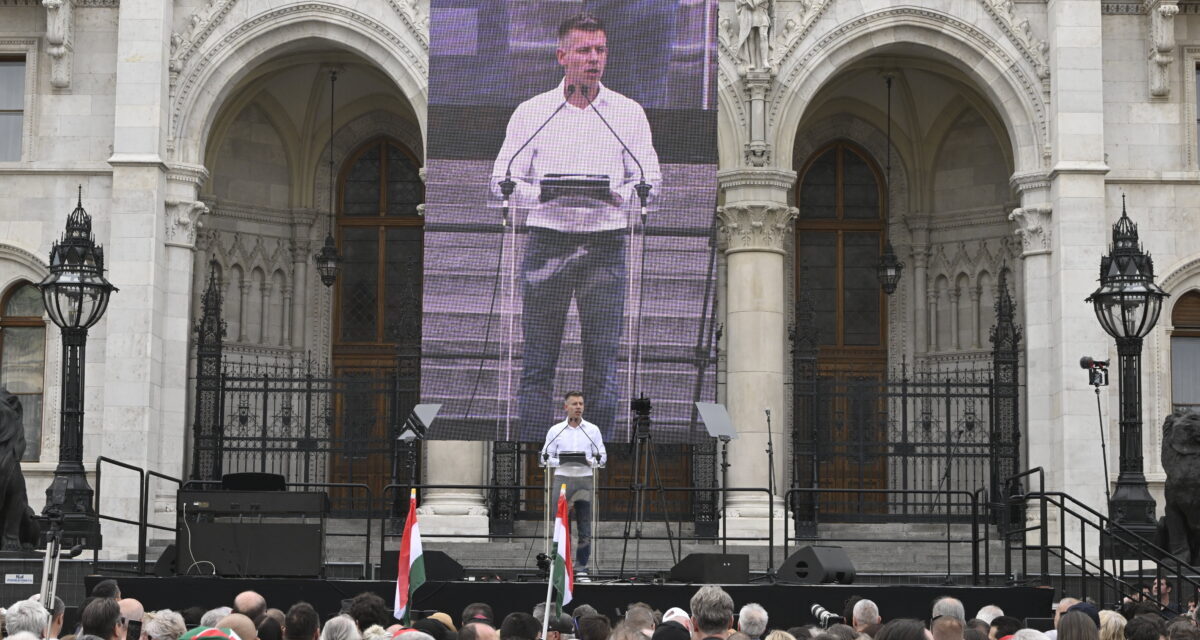At the weekend demonstration, the crowd who wanted to replace the system with something, anything, anything, did not listen to Péter Magyar, but to the zeitgeist, which manifested itself in the strange messiah standing on the stage; the beautifully packaged nothing.
Péter Magyar said exactly what they wanted to hear from him, what this middle-class crowd, which grew to tens of thousands of people, wanted. It was almost a physical pain to watch and listen to the flash interviews with those present, the screams of the desire "whatever we do, just be something else", the projection of the dreams of the deceived crowd into a fake card.
These people will be disappointed, again, only this time more than before, because their faith in the messiah has also increased. Sobering comes when they are faced with the fact that Péter Magyar only cares about one case, which is called: Péter Magyar.
Many people felt this profound emptiness and tried to put into words the infinitely disturbing something that arose in relation to this man.
By way of introduction, a few words about the zeitgeist, about which Ákos Győrffy, József Attila Prize-winning Hungarian poet, wrote a few years ago:
"He is not speaking, but the zeitgeist speaks from him, the famous, mysterious Zeitgeist, this intangible but all the more present phenomenon. In happier times, the zeitgeist still existed. He had a character, one way or another, he claimed something. The predicate was present in it, as Pilinszky writes.
The current zeitgeist can be recognized by the fact that it is empty. Linguistically empty, figuratively empty, conceptually empty. It does not assert anything, and what it asserts is also empty and meaningless. It comes from nowhere and goes nowhere, and in fact it is not present because it is empty. His demonic trait is due to this. That it is present everywhere, that it seeps everywhere, while being empty and non-existent. That's what's new about it, that's what makes it so chilling.
Until now, we did not know this, this inexhaustible presence of emptiness is only recently being experienced for the first time in the long and bitter history of humanity. Of course, there were lead-up circles, sensitizations, the twentieth century largely consisted of nothing else."
Journalist Áron Ambrózy noted the following in connection with the weekend demonstration:
"Apostles are multiplying, the former savior-candidates and those forming the third pole are all behind him, and the disciples filled the Kossuth Square. And they listened with amazing enthusiasm to the world's lamest, most boring, most banal speech, which a free ChatGPT can write better, but it was long...
The masses listen to nothing, heated. And they adore, admire, love. Because what he says is not shit, not bad, not wrong, but a big, fat zero. Its only message is ME.
A multitude of completely bewildered journalists tried to find out on the spot what the believers and disciples saw in him, but they did not get any closer to deciphering it either. Most of the respondents see special abilities in Péter Magyar, such abilities that he changes things. They were still able to name things that needed to be changed, but the how was pretty vague...
Péter Magyar is what he is. But the fact that the faithful, the disciples, are so undemanding, that they have no expectations of their savior, is quite shocking. A characterless person with quite a bit of psychopathy - that's enough. It suits them. One can only play O1G a little and enthusiastically hope that now the monastery pig, the belly, the voivode, etc. will really fail."
Ervin Csizmadia, the director of the Equity Policy Analysis Center, made this post after the demonstration:
"This will be a very subjective post, almost a confession.
I have to admit, today I broke one of the main rules of my profession (prescribed for myself, of course).
In recent decades, there has not been a speech given (and broadcast) by a leading politician that I did not watch, from the first minute to the last. In fact, I usually wrote about these speeches, and I watched them in order to be able to write about them authentically.
I started with this intention. But for many years I have heard a speech this afternoon which - I apologize to those who, for example, called this speech "very good" and so on. was held - I couldn't watch it. My body simply protested.
I apologize for breaking the rules of my profession. Suddenly, I can only say that since I was unable to watch it, I'm not even writing about it."
Annamária Isky, a former colleague of Judit Varga and an employee of the European Parliament, wrote the following a few weeks ago:
"Hungarian: fate or fiction? Kamu-flazz: mediocrity and life lies
Years ago, I got hold of Daniel Kehlmann's autobiographical novel, which had a great impact on me and I read it from time to time. The credo of "F" is that people often do not get the fate they were destined for. What is mediocrity experienced in practice when a person also has world-changing thoughts? What if you don't find your true calling? Difficult and pressing questions. They burn. They eat me up. They destroy and sometimes create.
Péter Magyar is a similar, but non-fictional character, who did not have the fate he imagined fitting, and therefore tries to test the fate and life path he imagined for him, by raping and capturing the space-time continuum and even those closest to him for a while. I have known the spiritual revolutionary for quite some time, who, as a child born on the first day of March, has been framing his identity in the heat of the revolution since his childhood. This can be very good for a while, in fact, it can be good and socially useful for a lifetime. However, sometimes, instead of building and creating a cathedral, all this turns into destruction of foundations and mysteries, betrayal, and manipulation. Phases and delays…
The protagonist of Kehlmann's novel is an apathetic, ambitious writer who takes part in the hackney of a wandering illusionist with his three sons. The Great Lindemann hypnotizes Arthur, who changes his mind, leaves his comfort zone, his family, and embarks on the path of the success he thinks he deserves. His books are popular, in spite of, or precisely because, they mostly express demagogic, empty, delusional ideas. I read in a review that Arthur's best-sellers are believed to display Coelho's "heights". Well, we're in the right place, I thought. The title of Arthur's book is My Name is Nobody. Its essence: the message of the book is written for a single person, and only he can decode the artistic message, which is based on camouflage. When asked what the message will be, Arthur says it depends on the reader. When asked who the reader is, he answers that it depends on the message... This is exactly what the readership needs, do they take it like sugar?!
At the dawn of his big march, I asked Péter briefly about where all this would lead? His answer: hi, doesn't it depend on a lot of things.
For weeks, the Hungarian public woke up and went to bed wondering what the MP would say today. Exactly what Arthur: a message disguised as an important, novel, world-savior, which is actually a kind of deception?
On the sidelines of the pardon case, Péter in revolutionary fervor (no hypnosis was needed for this, although he really is a master manipulator) launches a discrediting campaign against the establishment that does not accept him because of his sleazy character. There may be partial truths, useful criticisms, politics can always be done better, of course. However, why register the alleged "instructions" of the prime minister's wife, forgetting, as it were, that in her case the good Hungarian proverb "he preaches water, he drinks wine" stops completely here? Not the speck in other people's eyes, nor the beam in yours.
Mid-life crisis? Narcissistic personality disorder? Psycho? Genius? Influenza? Artist? Hobbyist? A tyrant, otherwise an excellent father? A vehement opinion leader?
It all depends on that. How about what? He thinks it's from us. I think it's from him.
Péter had nice and good, constructive "manipulations" and I hope there will be more nice initiatives in the service of the public good. I have seen and heard many of his great ideas. This is not the case now, despite the great march of likes.
Artificial intelligence. Don't be afraid to expose!"
***
The picture emerging from the thought fragments is more than disturbing. The magician casts a spell, omnicsarism , believes. He believes because he wants to believe, discarding the crumbs of reality, wants to feel instead of knowing, because he is waiting for a miracle that will never come true. And he really believes that all , only all the good can come.
The opposition middle class needs the expectation of a miracle like a morsel of bread, instead of God, if you like, so it prefers to believe in emptiness, nothingness, the nihilism of the zeitgeist, the big scam itself, rather than face the very real possibility that worse.
Those who now reverently follow Péter Magyar have no idea how fragile the relative prosperity and security of our time is. Especially not that their sense of security is provided by the safety net of the system, which is by no means flawless, but stands on a stable foundation, which they want to overthrow at all costs.
Author: Szilvia Polgári
Cover image: Lawyer Péter Magyar speaks at the National March and Demonstration for a New Hungary, which he announced, on Kossuth Lajos Square in Budapest on April 6, 2024.
MTI/Koszticsák Solid













